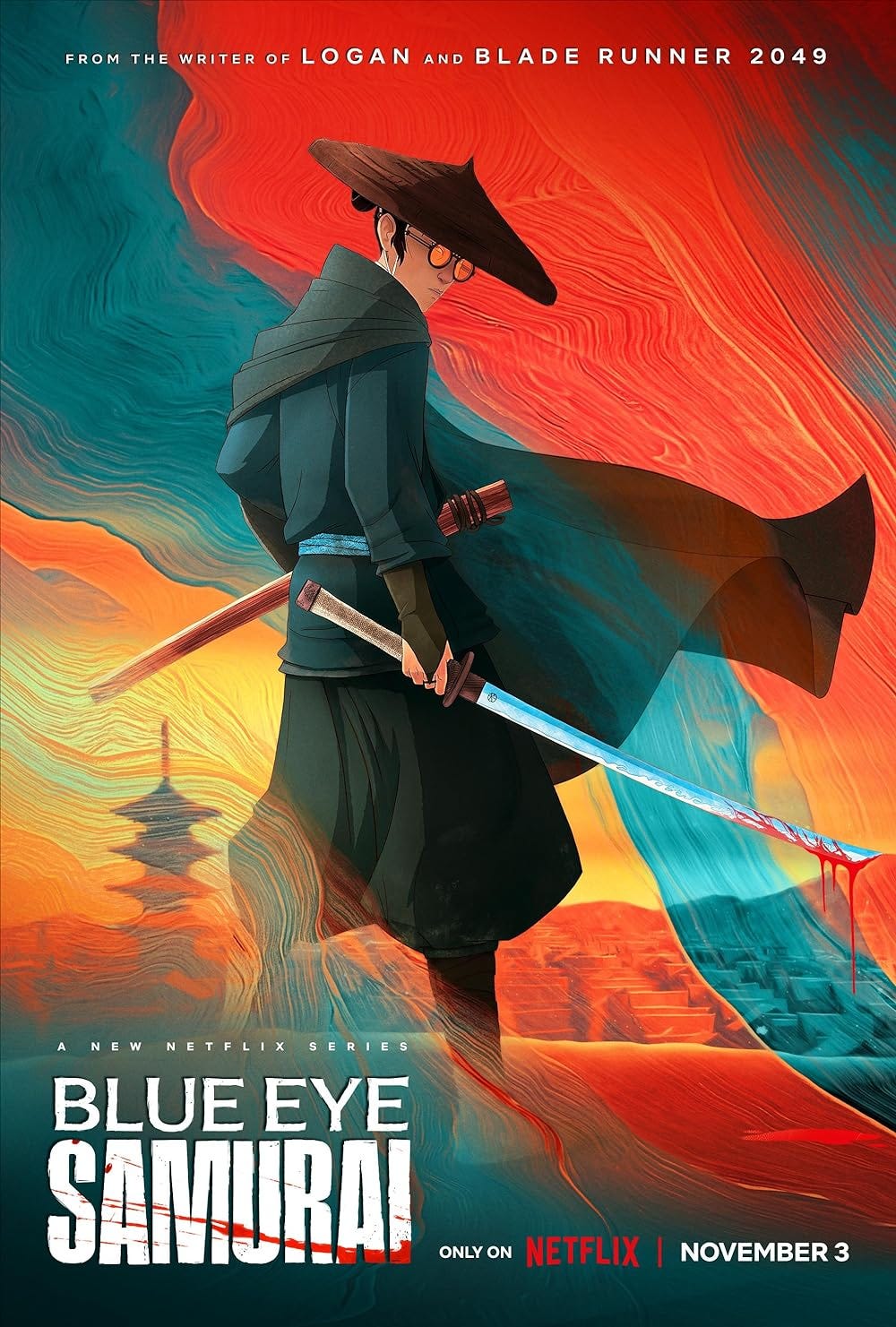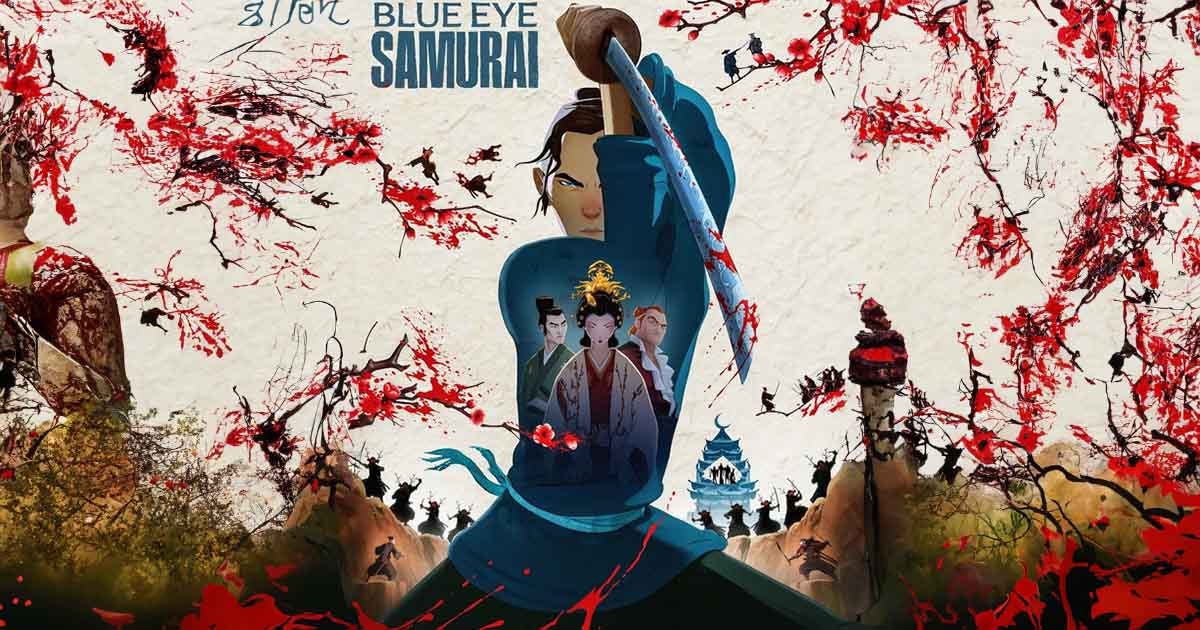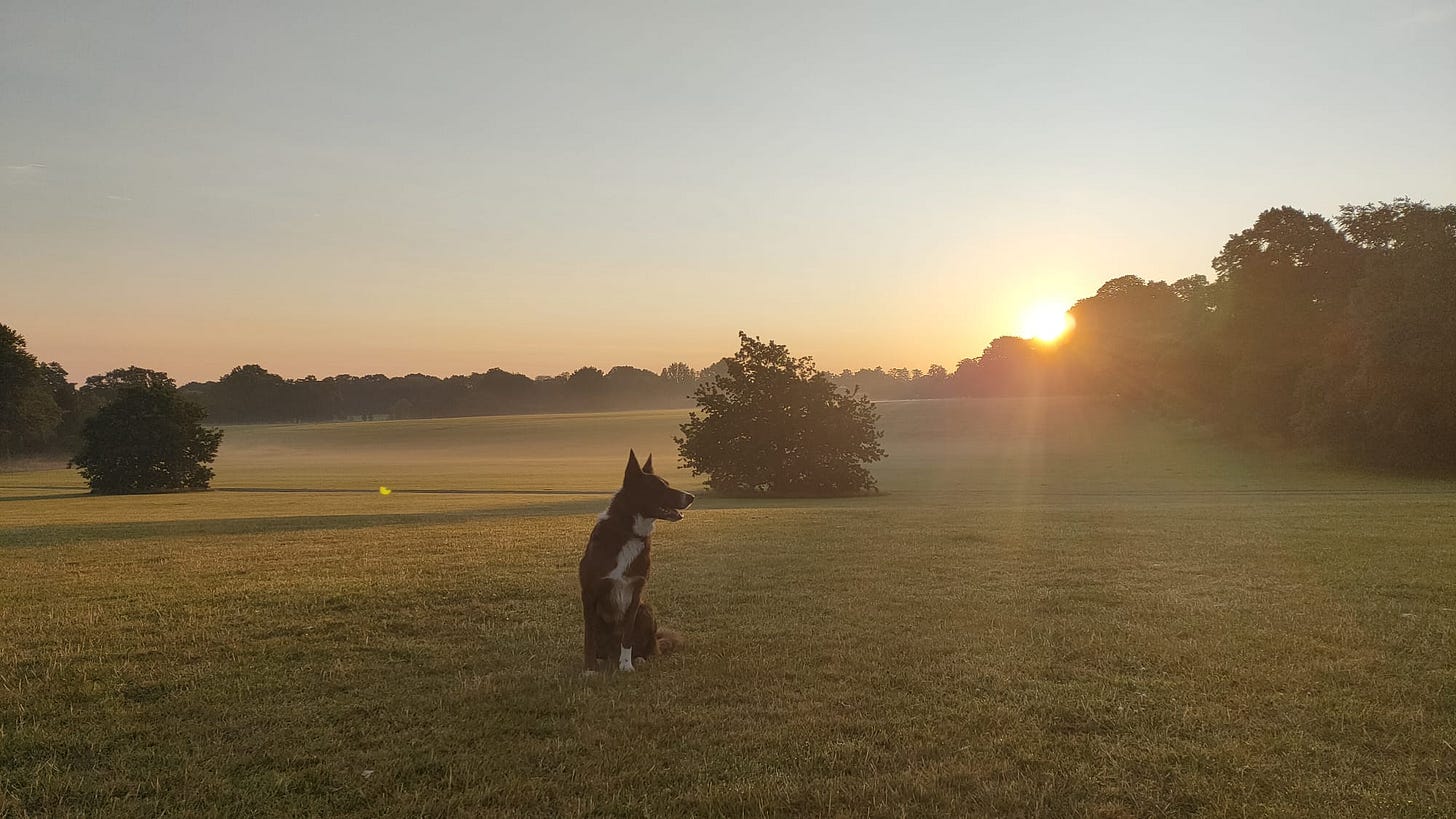Zahabi's Newsletter - July 24
Short stories from Infinite Worlds to Comma Press to Worlds of Possibilities; and a rant about the series Blue Eye Samurai.
Dear reader,
This month, we talk about various short stories and anthologies, we rant about the animated series Blue Eye Samurai at length, and we turn to Rebecca Solnit for optimism in the face of chaos.
What’s happening with the book
Summer has been, surprisingly, quite busy so far. Where short fiction is concerned, Infinite Worlds #13 published “The Ones Who Walk Towards Omeshraz” in June. I’ve just finished reading my own copy. I really love the gorgeous cover and fully illustrated glossy paper. The issue makes for a beautiful object, with some beautiful stories inside (for which, I hope, mine qualifies!)
“Shooting Stars”, a piece of flash fiction about the yearning to become – a writer, an artist, more than what we are; I hope everyone will read something different into it – will also be published in August, as part of Worlds of Possibility.
I’ll also be attending WorldCon in early August. I’m excited about it, although I believe I’m not allowed to say anything about the programme yet. You’ll just have to come and find out what all these lovely SFF people will be talking about! I’ll just say I’m excited about my panels. I’ll be going as myself, novelist, but also as a gamewriter for Larian Studios. I suspect it’ll be a strangely schizophrenic experience, wearing both writing hats at once.
Finally, I’d like to talk about Iran +100. The project has just received a grant from the PEN Translates award. I cannot say much yet, but Comma Press is an indie press based in Manchester, and they’ve published a whole series of groundbreaking science-fiction anthologies from the Middle East. Watch this space!
What’s happening on the page - Right Ingredients, Wrong Recipe
On paper, I should love the samurai Netflix series Blue Eye Samurai. All the ingredients appear tailored to my personal tastes: there’s a mixed-heritage protagonist, swordfights, a feminist bend to the traditional shonen adventure of seeking revenge, and beautiful combat animations.
And yet.
As I was watching it, I wondered why I didn’t love this story that clearly had all the ingredients to make me love it. It was like watching mayonnaise refusing to take as you mixed it – for some reason, the ingredients, as tasty as they were, never coalesced into something I found palatable. I had a push-and-pull, love-hate relationship with it, because I watched every episode without giving up, yet never felt satisfied.
The first reason why, I think, is because the tone shifts: the story takes itself too seriously at times, which wouldn’t be a problem in itself, but then it doesn’t follow through. It wants to have its cake and eat it: the fights have to be brutal and serious, but a wounded character can shrug off broken ribs that stopped them the scene before, or heal a twisted ankle, or ignore a blade wound or a fall that would’ve killed them. The dungeon episode*, in which our main character fights her way through what is literally a videogame dungeon crawl, killing enemies and jumping over traps in an architectural nightmare that makes absolutely no sense if someone ever hoped to live in that place, is a shocking break in tone. I can hang out in silly trap dungeon land, or I can live in serious, technical martial arts land, but I cannot live in both at the same time.
*Not its official name. Episode 6, “All Evil Dreams and Angry Words”.
Another problem was the way the show treated the main sidekick, a character with a disability – he’d been born without hands. I’ve found representations of realistic disabilities and the challenges to overcome them hard to come by. Blue Eye Samurai is no exception to the trend. It basically treats its character as if he had hands. The disability is there to give him sympathy points, but he never, ever has any trouble doing anything – eating with chopsticks, buttoning up clothes, sewing up wounds – that would require fine hand motricity. The problem is, it’s not a disability in that case, it’s just character design. Surely, a man with no hands in feudal Japan faces huge challenges. And that has to be the point. He can’t do certain things, society isn’t tailored for him, and yet he still has value as a human being and can still achieve great things – but we, as viewers, through his eyes, see how unwelcoming our society is to people like him. How much harder he has to struggle. Whereas if he can do everything as if he had hands, it really feels like he got stuck with a label, with no attempt to follow through on what his lived experience would be like in that context. He’s an able character in everything but name.
I have the same, or nearly the same, problem with some of the women’s oppression in the series. Certain female characters – not our main character, actually, as she lives as a man, but the secondary subplot female character – feel unrealistic. I just didn’t believe in the level of independence she displayed. She read as an American woman with a feminist bend from the 21st century, somehow surviving in feudal Japan. The men around her also reacted as if some of her worldviews were reasonable for their historical and cultural context, which I just didn’t buy. Don’t get me wrong: I’m all for women being cool and badass in fiction. But in my mind, if the work wants to represent a culture or an epoch seriously, it has to address and face the issues of the time, not gloss them over.
If you compare Blue Eye Samurai to the Apothecary Diaries, I think the latter does a better job at writing women’s lives in its era. A lot of the women feel more credible because their life is very constrained. They still get to be main characters, and most of the supporting cast, and have agency in the story. (It helps that the Apothecary Diaries takes itself less seriously, and thus can afford to fudge historical accuracy a bit.) The Apothecary Diaries contains quite a lot of interiorised misogyny – it’s by no means a feminist story – yet it’s a women-centric tale about a working-class girl finding her way in the emperor’s harem, and that in itself is interesting to me. Exploring the lives of these women without denying the oppression they went through interests me – but Blue Eye Samurai assumes (wrongly) that a woman can brute-force her way out of patriarchy. If resisting patriarchal power structures were purely a question of willpower, it wouldn’t exist.
This being said, I liked the way gender is never really addressed for our main character throughout Blue Eye Samurai. That, to me, felt very real and powerful. She dresses as a man and fights as a samurai and doesn’t really address whether she’s a man or woman for most of the series. Thanks to the format, pronouns can be eschewed part of the time, and let her stand in a liminal space, where she can exist as a samurai before she is defined by her gender.
There is the episode where she’s married, but maybe let’s not talk about that.
Or maybe let’s! A lot of the series feels experimental. It likes trying new things, and the structure of Episode 5, “The Tale of the Ronin and the Bride”, is quite unique. The story of our main character is happening in parallel to a theatre play recounting the tale of the ronin and the bride. The play echoes the events of the episode, although of course our main character is both ronin and bride. The episode doesn’t quite work for me, but at least it tries something new, structurally. Unfortunately, we lose clarity, focus, a sense of forward momentum in the narrative. It muddies its own waters – it might have worked better as a separate, standalone story.
No doubt the reason I’m so frustrated with Blue Eye Samurai is because there is a lot of stuff I do like, despite it all. I thought the main villain had some smashing lines – for example, he threatened his Japanese colleagues and warned them that, once colonised, culturally, they’d find White faces more beautiful than their own. The real-world implications of that line, and its delivery, make for a great villain speech. When confronting the hero – his child, potentially –, and admiring the destruction she’s wrought, he says playfully, “Maybe you are one of mine.” The implication that her will to destroy him drew her to be more like him is a delicious detail.
I also always like a good battle. I like it aesthetically; I find it visually satisfying if the animation can pull it off. More than that, though, it also frees something within me – it’s deeply cathartic. I love driven women pursuing their dreams. But I also crave for the emotional nuance these revenge stories don’t naturally have: what happens to those who are vulnerable, for example? What happens to those who aren’t driven – are they condemned to never be treated fairly? What are the implications of wanting to destroy your own father? That must change how you perceive yourself, rejecting half of your identity.
Another one of my personal pet peeves is the complete absence of mothers. At a stretch, Blue Eye Samurai gives us one negative mother figure who is sidelined in an episode or two, without any of the nuance fathers get to benefit from. Our MC has five potential fathers (the one who raises her, plus the four she has sworn vengeance against and that motivate the whole plot) and one mother (who is dealt with in one episode, and then implied to not be her mother after all in a one-liner). That can’t be right. She’s a woman who chooses to live as a man in a world made for men, and to define her whole life around the men who fathered her – I need to see more involvement of mothers in fiction in general, but definitely for this particular character.
The series also serves us lots of sex that doesn’t feel particularly plot-relevant, and gratuitous violence, that I mind less or am more inured to. To be honest, I could live with both, except for a few moments that feel completely stupid. When the main character forges something under the snow completely naked, I got annoyed. Anyone that slim staying naked in the snow all night is getting frostbite. Anyone forging naked is getting burns. This wouldn’t matter if the tone was wacky enough to justify it, but then this forging becomes more openly fanservice (which is, I suppose, what it is anyway). It just makes no sense – if it’s not a serious piece of animation, then something misleading is happening with the art style or the music or the plot, that gives off the wrong vibes continually.
I will stop my rant here. It is often a mystery to me why I love a piece of art, why certain words, themes, structures, seem to speak to my soul. Why do I feel connected, across space and time, to someone I have never met, talking about a life I will never lead? There is something deeply human in consuming and creating art.
And, sometimes, the opposite happens: we meet someone in a crowded room with whom we feel we should have lot to talk about, and yet there are no sparks. Maybe these annoy us more, because we were so close to making meaningful contact.
What’s happening with me – Being an Adult
I’ve been busy at work and worried by family matters and tired about politics, all very mundane, very adult things to do. I can feel the Muse kicking her heels as we both get bogged down into the day-to-day grind. On the politics side of things, I’ve found Rebecca Solnit’s latest essay on LitHub to be a great comfort.
On the bright side, I’ve been learning – about game writing, how to make the dialogue tight and powerful; about narrative design; about agency in stories; about working without a narrator. I love working in a multicultural office, where everyone is from elsewhere, working in their second language, navigating a culture they weren’t born in. It makes for interesting clashes around the lunch table.
Last but not least, I’ve been walking through Guildford, enjoying the small green town. Even the hot weather cannot truly slow Sancho down!










